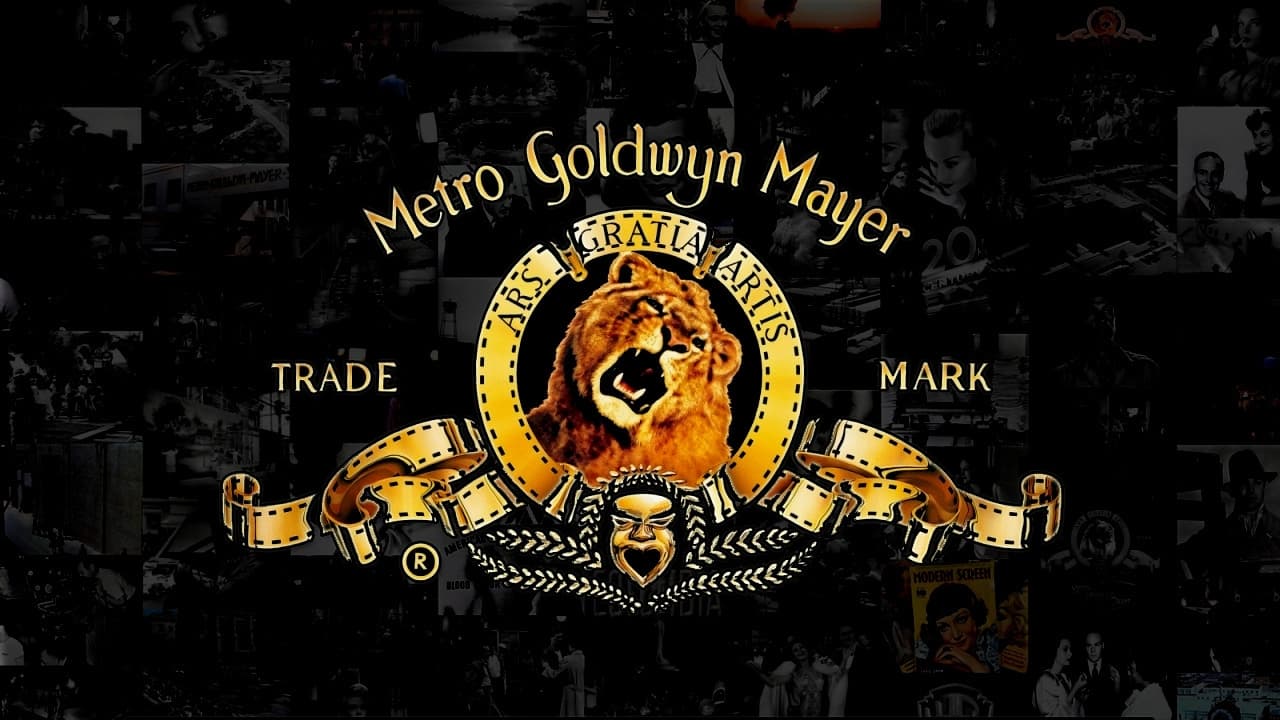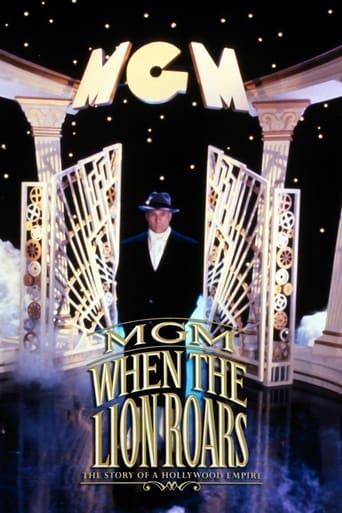



The greatest movie ever made..!
Better Late Then Never
Amazing worth wacthing. So good. Biased but well made with many good points.
View MoreBlistering performances.
The world of the Hollywood studios is like a country towards itself: like the Vatican within Rome within the country of Italy. Yes, studio head Louis B. Mayer had to answer to the money men in New York and had to follow legal corporation laws set by United States law, but for nearly 30 years, he ran his empire with an often iron fist, like a loving but strict father who had to keep his children in line. Often, he'd have to deal with spoiled stars, falling legends and over budget producers and directors, but when he stepped out of his suite of offices to go onto a set, the studio trembled in anticipation as he made his way to where he normally would not set foot. There were visits to ancient Rome (the silent "Ben Hur"), a shaking San Francisco, a mythical country over the rainbow, war torn Europe and a Broadway where a musical show larger than any stage could be performed and the audience able to see everything.As narrated by "Star Trek: The Next Generation's" Patrick Stewart, this mini-series documentary profiles the movie studio that proclaimed more stars than there are in the heavens. Surely that was true. Silent era legends like Lon Chaney, Norma Shearer, Ramon Novarro, Lillian Gish, Garbo (only a last name for her was needed for the audience to know who she was) and John Glbert, some of whom did not transition well into the talkies, some of whom died early on. Rising stars like Joan Crawford, child stars like Mickey Rooney and Judy Garland, short term triumphs like Helen Hayes and Luise Rainer, and later pin-up girls like Lana Turner and Ava Gardner. The British invasion of famous actresses like Greer Garson and Deborah Kerr, hunks like Robert Taylor, Clark Gable and Howard Keel. The very independent Katharine Hepburn and her very talented long time co-star Spencer Tracy. The sophisticated comedy of William Powell and Myrna Loy. Too many to mention, yet thanks to TCM, the Warner Archives (an ironic twist in how MGM films come out on video today) and scores of memorabilia, these films and their stars and often directors will never be forgotten.There's the product: lavish musicals like "The Merry Widow", "Meet Me in St. Louis" and "Gigi", film version of the classic literature "A Tale of Two Cities", "David Copperfield", "A Christmas Carol", "Gone With the Wind" (only released by MGM, yet a part of their legacy as well) and "The Good Earth", and plays like "Dinner at Eight", "The Barretts of Wimple Street", "The Philadelphia Story" and "Romeo & Juliet". Historical epics like "Marie Antoinette" and "Queen Christina", operettas with Jeanette MacDonald and Nelson Eddy (still surprisingly popular today!), and a heavyset old woman who could stir up laughs by just eyeing Jean Harlow up and down. "Reading a book?", Marie Dressler asked, leading to a punch line that made it past the censors even in pre-code Hollywood. And then there were the series films, a precursor to TV. The Andy Hardy series honored what Mayer believed the All American family should be; A young doctor named Kildare dealt with his patients the way we would hope that all doctors would. A feisty young woman named Maisie revealed her heart of gold with everybody she encountered. While sipping martini's, Nick and Nora Charles solved murders. A beautiful Englishwoman discovered the sexy Tarzan the Ape Man and created years of adventures. Mickey and Judy put on shows in a barn and ended up babes on Broadway. There's the scandal. The fights between Mayer and the top unit producer Irving Thalberg, pretty much working himself to death and getting a caustic Mayer to claim that God was on his side in their feud. The affairs of certain actors kept out of the press, the secrets that certain actors were homosexual (thrust into loveless marriages in several cases) and ultimately the firing of Mayer by the money men in New York after his demanding that it was either him to go or new top producer Dory Schary. Actors interviewed recall seeing Mayer at the racetrack after his firing and describing him as a broken man. There are parallels to modern Hollywood, and scandals revealed that aren't discussed here reveals that there was much more going on than Hollywood gossip columnists were allowed to reveal at the time.Made for cable just as TCM was being launched, this documents so much and features many interviews with those who were there, either for old newsreels or newly filmed interviews. Helen Hayes described Mayer as evil, while Maureen O'Sullivan ("Tarzan") indicated that she only knew nice people. June Allyson discusses her friendship with Judy Garland and tears up. This covers much of the post golden years as well, the closing of the backlot, the auctions of costumes and props (many of them purchased by Debbie Reynolds for her museum) and the focus on the Las Vegas hotel MGM Grand which took away much of the movie studio's assets. Business men without the passion of making movies helped turn MGM into a lesser Hollywood studio, but eventually Ted Turner stepped in, at least getting the archives out there. He only ran the studio for a very short time, but starting TCM would add a new name into the list of those who did care. Thanks to him, these features are regularly shown, and shorts and other specials not seen in years have come to light. The lion may have roared the end, but for a time, it was the growl heard 'round the world.
View MoreBack in 1972, Dick Cavett narrated a documentary about the history of MGM. Unfortunately, it was crammed into only 50 minutes and seemed way too short for so much material. Well, fortunately, twenty years later, Turner Entertainment made what is the definitive documentary--"MGM: When The Lion Roars". Narrated by Patrick Stewart, it's chock full of wonderful clips and interviews with a bazillion stars. It really is extraordinary and very complete--and a must-see for insane cinemaniacs like myself.By the way, does anyone know why most of Fred Astaire's clips were excised from the DVD release?! IMDb says this is so but never really explains this. Were there legal reasons or did someone hate Mr. Astaire?! What gives?!
View MoreWhen I first saw this on TNT back in 1992, I was disappointed. I thought there would be more background on Marcus Loew, Metro, Goldwyn and Louis Mayer's pre-1924 history. I was also (unjustly) critical of Patrick Stewart's hosting, the exclusion of certain favorite films, and the very limited coverage of Cedric Gibbons (not to mention many other MGM luminaries) and the short subject departments.However, time has been kind to this series. Watching it on DVD has been quite refreshing (even with the Astaire edits harped on by fans). Since '92, I've seen parts of the RKO series (and dying to see more!), enjoyed the 20th Century Fox's "First 50 Years" and its "Blockbuster" sequel (although these utilize too many film clips and not enough back-lot story) and was, once again, a bit disappointed with YOU MUST REMEMBER THIS (Warner Bros.). WHEN THE LION ROARS is as good of a film studio overview as you can get in three two-hour installments.For one thing, we get a lot more coverage of the Culver City lot than we ever get of the Burbank lot in YOU MUST REMEMBER THIS, despite (and perhaps because of) the fact that so much has been bulldozed to the ground. I visited Warner's twice on their tours and was surprised at how much of it is still intact. I can only imagine how great MGM (the surviving parts owned by Sony) would be today, had anyone listened to Debbie Reynold's suggestion of it being a "ready-made Disneyland".Although the glory lies in the classic film clips, much of its heart come from the interviews. Margaret Booth's comment that "we never made bad pictures" emphasizes how the art of film editing kept MGM the top dog of the business. Samuel Marx's observation of Louis Mayer crying during LASSIE COME HOME (produced by future adversary Dore Shary) speaks volumes... even if Mayer was the best "actor" of the studio. Earlier footage of Lillian Gish, King Vidor and Eleanor Boardman are cleverly utilized from the BBC's 12-year old Hollywood series in Part 1's coverage of the silent years.I once thought Patrick Stewart's narration and dramatic introductions a little too... shall we say?... "hammy". Today, they serve as a pleasing initiation into the "make believe" factory. His walk in front of a screen showing 1925's BEN HUR chariot race is as equally effective as any of the interviews; it demonstrates how thin the line between industry "product" and fantasy was during Hollywood's Golden Age.
View MoreThe meteoric rise (and lamentable fall) of, perhaps, the most legendary Hollywood movie studio is documented here, in a dazzling three-part mini-series as lavishly designed as the best of the MGM films themselves. Pure gold for movie buffs (and as easily accessible to the average viewer); "When the Lion Roars" combines a grippingly-told account of MGM's history, rich with tons of vintage film clips, interviews with studio stars, and a fascinating look at such legendary figures as L.B. Mayer and Irving Thalberg - all ably hosted by Patrick Stewart, who is clearly enjoying himself throughout.And well he should be. There are scores of documentaries out there about Hollywood's Golden Age, but none even REMOTELY approaching the quality and craftsmanship of "When the Lion Roars". This is quite possibly one of the finest documentaries ever made. It has been released on video and, though not the easiest thing to find after seven years, is well worth the search.
View More